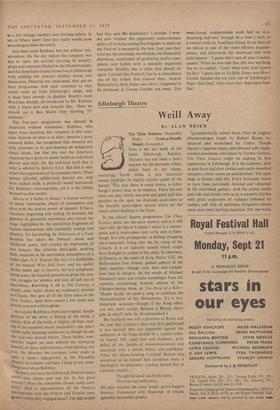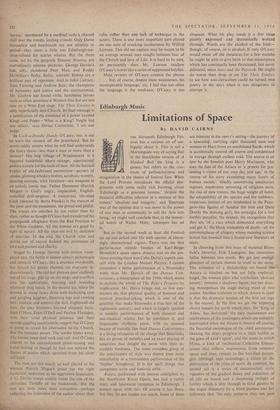Edinburgh Theatre
Weill Away By ALAN BRIEN The Thrie Estaites. (Assembly Hall.) — Cock-a-Doodle Dandy. (Lyceum.)
Tins is the last week of the latest Edinburgh Festival. Thirteen has not been a lucky number for the dramatic critics, exiled here in the sleepy, sweltering North while a new theatrical season explodes its nightly salvoes south of the border. This year there is more drama in Edin- burgh's streets than in its theatres. There has not been one play which was new and good and also peculiar to the spot; no dramatic equivalent to the Swedish space-opera Aniara which set the music critics duelling in the foyer.
In the official theatre programme The Thrie Estaites alone has the same stature; and it is 400 years old. Sir David Lindsay's satire is a master- piece, and a masterpiece only to be seen in Edin- burgh. It is also propaganda—a flailing swingeing cat-o'-nine-tails biting into the fat rump of the Church. It is an indecent assault which might have brought its author to the stake. In Germany, in Geneva, at the court of King Henry VIII, the Reformation had already gained control of the State machine—though even here anti-Catholi- cism had its dangers. (In the words of Michael Flanders's witty and erudite monologue from the superbly entertaining Scottish edition of the Flanders-Swann show, At The Drop of a Kilt— 'Master Kydd, we need a song to celebrate the Nationalisation of the Monasteries. It's a very important occasion—though if the King offers you one, don't accept. Because if Bloody Mary gets in they'll only be de-nationalised.') But Scotland was still a province of Rome and the year that Lindsay's play was first performed it was decreed that any argument against the authority of the Pope should be a capital crime. Sir David, MP, court poet and diplomat, gaily defied all the threats of excommunication and execution with a jovial, brutal self-confidence. When the heresy-hunting Cardinal Beaton was murdered as he himself had murdered many a theological revolutionary, Lindsay buried him in a laconic couplet : Though the deed was foully done, The loon was weill away.
His play sustains the same tough, grave-digger's humour illuminated with flourishes of simple, splendid, humanistic poetry. Sympathetically edited down from its original Oberammergau length by Robert Kemp, re- inforced and underlined by Cedric Thorpe Davies's vigorous music, and directed with single- minded passionate conviction by Tyrone Guthrie, The Thrie Estaites might be making its first appearance in Edinburgh. It is the audience, with its pale faces and drab clothes and mealy-mouthed whispers, which seems an anachronism. The open stage is riotous with life. Every bystander seems to have been personally directed and rehearsed in his individual gesture. And the action swells and rolls and breaks over us in a masterly rhythm with great explosions of violence followed by sudden, soft lulls of quietness. Forgotten abuses seem once more burning injustices. The one word,
'heresy,' murmured by a cardinal casts a charnel chill over the rowdy, jostling crowds. Only Dame Sensualitie and handmaids are not securely in period—they seem a little too Edinburgh-tea- shop-refined for scarlet whores. But the three vices, led by the gargoyle Duncan Macrae, are marvellously epicene parasites. George Davies's lost, silly, plundered Poor Man, and Roddy McMillan's fleshy, flashy, sclerotic Bishop are a brilliant pair of opposites. And in John Cairney, Torn Fleming and Andrew Keir, the champions of humanity and justice and the commonweal, Mr. Guthrie has found virile, handsome heroes' such as often dominate a Western film but are too rare on a West End stage. The Thrie Estaites is only superficially anti-Church. Its final message is a justification of the existence of a power beyond Kings and Popes—'What is a King? Noght but ane Aker,' says Divine Correction, '1 am ane judge.'
In Cock-a-Doodle Dandy O'Casey, too, is out to scare the cassock off the priesthood. But he seems oddly unsure what he will find underneath the fancy dress—less than a man or more than a demon? His bdg village of Nyadnanave is a haunted battlefield where strange, supernatural powers wrestle for the souls of men. All the farcical byplay of old-fashioned pantomime—geysers of smoke, glowing whiskey. bottles, acrobatic scenery, dancing animals, trick furniture—are weapons in an unholy comic war. Father Domineer (Patrick Magee) is God's angry, implacable, English- vowel led drill-sergeant. A monstrous, life-sized Cock (danced by Berto Pasuka) is the mascot of the poor and the passionate, the proud and pitiful. The troops are enrolled by sex rather than by class, rather as though O'Casey had transferred his propaganda allegiance from the Red Prussian to the White Goddess. All the women are good by light of nature. All the men are evil by darkness of doctrine. In the end, the Church wins and drives out of sacred Ireland the priestesses of love and pasSion and charity.
Staged by George Devine with tireless roust- about zest, the battle is almost always picturesque and comical. O'Casey, like 'a drunken wordsmith, has forced his gaudy rhetoric on everyone in- discr Minately. The red-hot phrases pOurendleSsly out of his forge, pile up on the stage, and overflow into the auditorium, burning and branding wherever they touch. In the second act, when the women in cheap fancy dress with beckoning eyes and gurgling laughter, flaunting legs and swirling hair, encircle and ensnare the dull, frightened old men, the play blossoms beyond eloquent farce. Joan O'Hara, Etain O'Dell and Pauline Flanagan, with their vivid physical presence and their strange giggling cameraderie, suggest that O'Casey is going to reveal his alternative to the Church. But the moment passes. The smoke blows away. The houses cease their rock and roll. And O'Casey returns to his old-fashioned priest-teasing and kulalsr-baiting as though he had not noticed the flames of genius which sprouted from his silver old head.
The men are not nearly so well played as the women. Patrick Magee's priest has the right hysterical undertone to his aggressive fanaticism. J. G Devlin creeps craftily inside the role of the shrivelled Tartuffe of the backwoods. But the rest are little more than competent—perhaps reflecting the indecision of the author about their roles rather than any lack of technique in the actors. There is one more important part played on one note of creaking incoherence by Wilfrid Lawson. This old sea captain may be meant.to bfr an average sensual man caught between fear of the Church and love of Life. It is hard to be sure„ so persistently does Mr. Lawson swallow O'Casey's words like a series of suppressed belches.
Most reviews of O'Casey contain the phrase . . but, of course, despite these weaknesses, his incomparable language,' etc. I feel that too often the language is the weakness. O'Casey is too eloquent. What his play needs is a few ideas plainly expressed and dramatically worked through. Words are the alcohol of the Irish— though, of course, so is alcohol. If only O'Casey would swear off the thesaurus for a few months he might be able to give birth to that masterpiece which has continually been threatened, but never delivered, since Juno and the Paycock. He might do worse than drop in on The Thrie Estaites to see how anti-clericalism could be turned into poetry in the days when it was dangerous to attempt it.



































 Previous page
Previous page